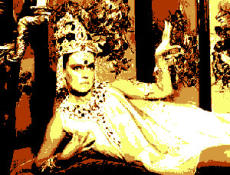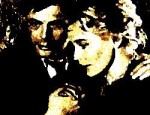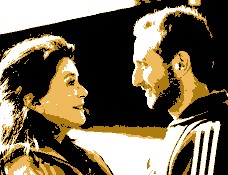Film Review

Moreau was famously Truffaut's muse at the time and Richard was the father of her son. It should be noted that Moreau's performance has nothing in common with the flamboyant melodrama imagined for Greta Garbo in the 1930s. Moreau's interpretation of Mata Hari shows a woman with many faces - fragile and dangerous, pure and diabolical, loving and cold-hearted. Filmed between Anthony Asquith's The Yellow Rolls-Royce and Louis Malle's Viva Maria!, this tender and melancholic piece of work follows a human legend who was a victim of circumstances and who, without her knowing it, became a myth.
This French version of the notorious spy's life centres less on Mata Hari's romantic escapades and more on those that reveal the person she actually was. The truth is that Mata Hari was not an exceptional spy. In fact, she delivered very little information of value to her various employers. Once more, fiction and reality are two different things and we never saw a more mundane spy career glorified with such an inventive scenario.
Alongside Jeanne Moreau we recognize two marvellous actors: Jean-Louis Trintignant and Claude rich. Trintignant first received international recognition in 1956 when he was paired with Brigitte Bardot in Roger Vadim's Et dieu crea la femme.... and met with further acclaim when he starred in Claude Lelouch's Un homme et une femme (1966). Claude Rich is an eclectic actor of stage and screen (here, he plays Mata Hari's chauffeur) who began his career in the 1950s in René Clair's Les Grandes manoeuvres. Both Trintignant and Rich are important figures in French cinema, eagerly sought after by world-renowned filmmakers and both give great value in this enjoyable Mata Hari romp.
© James Travers, Willems Henri (Brussels, Belgium) 2012
The above content is owned by frenchfilms.org and must not be copied.
Next Jean-Louis Richard film:
Bonne chance, Charlie (1962)
Bonne chance, Charlie (1962)
Film Synopsis
The travails of WWI do not prevent the Alcazar music hall from being sold out for the performance given by the star of the show, a beautiful dancer of Javanese origin named Mata-Hari. In a crowd consisting of civilians and soldiers, some men are sketching the dancer in her exotic outfit. Another man is busy with a pen and paper, but he is not drawing - he is writing down a series of numbers, numbers which seem to tally with the movements of Mata-Hari's fingers whilst she is dancing. When she returns to her dressing room, Mata-Hari finds a huge bouquet of flowers from an unknown admirer. On the seemingly blank visiting card she uncovers a message inviting her to a secret rendezvous in a Parisian street. Here she meets Ludovic, the man who received her coded message at the theatre. He instructs her to attend a society party that same evening, where she will meet a certain Captain François Lasalle. The latter will be carrying an attaché case containing some secret documents. Mata-Hari, otherwise known as agent H21, is a German spy, and her next assignment is to seduce Lasalle and lure him back to her apartment so that the vital documents can be stolen. It will be a night that will decide Mata-Hari's future...© James Travers
The above content is owned by frenchfilms.org and must not be copied.
Similar Films
Here are some other films you may enjoy watching:- The Wild One (1953)
- Le Miroir à deux faces (1958)
- Crin blanc: Le cheval sauvage (1953)
- The Bachelor Party (1957)
- The Hustler (1961)
Other related links:
Film Credits
- Director: Jean-Louis Richard
- Script: Jean-Louis Richard, François Truffaut
- Cinematographer: Michel Kelber
- Music: Georges Delerue
- Cast: Jeanne Moreau (Mata Hari), Jean-Louis Trintignant (Captain François Lasalle), Claude Rich (Julien the Chauffeur), Henri Garcin (Gaston), Georges Riquier (Ludovic), Franck Villard (Colonel Emile Pelletier), Albert Rémy (Adam Zelle), Hella Petri (Baronne du Maine), Nicole Desailly (Charlotte), Carla Marlier (Ernestine), Jean-Marie Drot (German Spy Chief), Marcel Berbert (Detective Following Mata-Hari), Georges Géret (Soldier 2), Henri Coutet (Soldier), Charles Denner (Soldier 1), Max Desrau (Spectateur at the Alcazar), Van Doude (Policeman at the Bank's Entrance), Marie Dubois (Marie, the Young Girl), Yvette Etiévant (Nurse at the War Front), Marcel Gassouk (Policeman)
- Country: France / Italy
- Language: French
- Support: Black and White
- Runtime: 98 min
The very best of Italian cinema

The best of Japanese cinema

